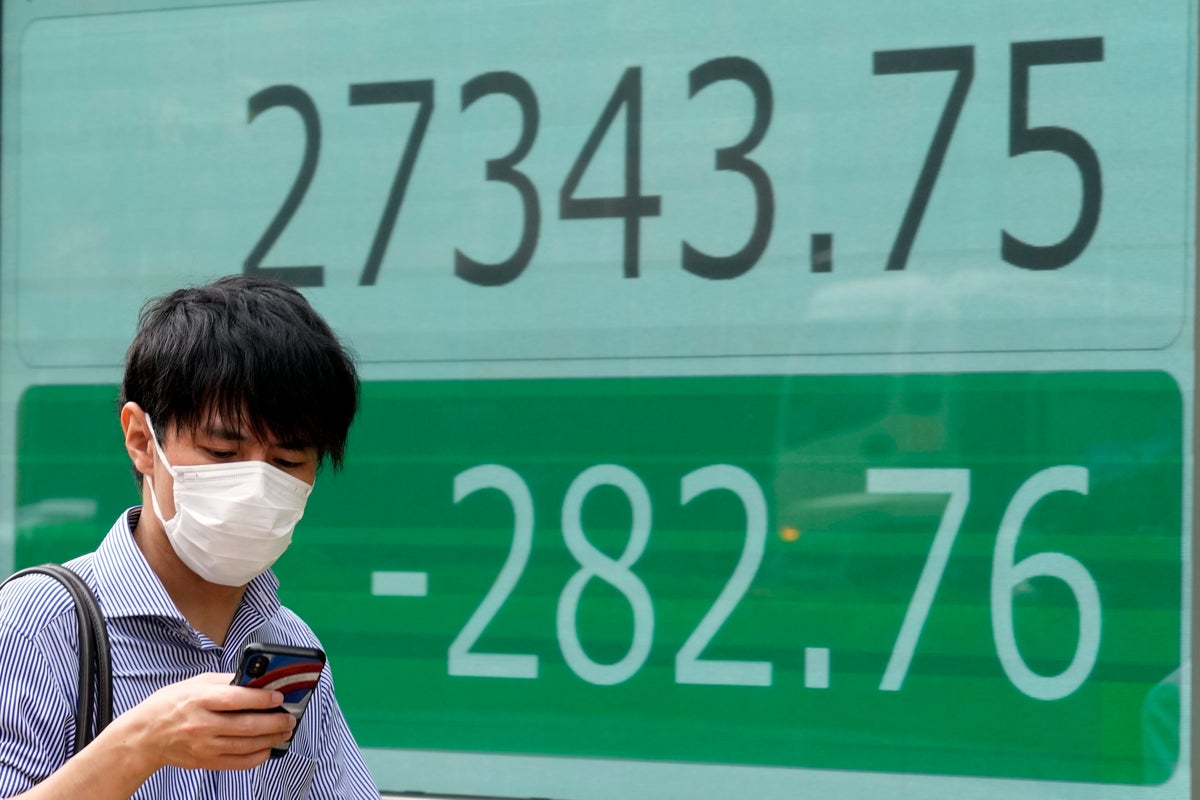
Asian shares were mostly lower Wednesday, as pessimism prevailed about higher interest rates ahead and Wall Street continued a late-summer slump.
Shares fell in Tokyo, Sydney, South Korea and Hong Kong, but were little changed in Shanghai. Oil prices fell, while the Japanese yen continued to decline against the U.S. dollar to about 144 yen.
“The mood in markets is defensive ahead of key central bank decisions,” said Anderson Alves at ActivTrades.
Rising energy prices are adding to the worries about recessions in some parts of the world, he said.
In Japan, the government is giving 50,000 yen ($350) to needy families, to help cope with daily needs and energy prices in a move also designed to boost the lagging economy.
“The real solution to this inflation crisis obviously lies on the supply side, in terms of energy and other key goods. Yet that really takes us a step away from inflation-targeting and back towards an echo of how macro-stability was previously achieved,” according to RaboResearch.
Japan's benchmark Nikkei 225 shed 0.7% to finish at 27,430.30. Australia's S&P/ASX 200 dropped 1.4% to 6,729.30. South Korea's Kospi slid 1.4% to 2,376.46. Hong Kong's Hang Seng dipped 1.0% to 19,003.55, while the Shanghai Composite was little changed, inching up less than 0.1% at 3,245.22.
China’s trade weakened in August as high energy prices, inflation and anti-virus measures weighed on global and Chinese consumer demand, and imports of Russian oil and gas surged, China's customs data showed. Exports rose 7% over a year ago, decelerating from July’s 18% expansion, while imports contracted by 0.2%, compared with the previous month’s already weak 2.3% growth.
Demand for Chinese exports has softened as Western economies cool and the U.S. Federal Reserve and central banks in Europe and Asia raise interest rates to contain surging inflation. At home, repeated closures of Chinese cities to fight virus outbreaks has weighed on consumers’ willingness to spend.
Shares fell on Wall Street coming into a holiday-shortened week. The S&P 500 fell 0.4% after bouncing between a gain of 0.5% and a loss of 1%. The Dow Jones Industrial Average fell 0.6% and the Nasdaq lost 0.7%.
The major indexes are coming off their third losing week in a row, part of a late-summer slump that erased much of the benchmark S&P 500's gains from July and early August.
Stocks have been losing ground as the Federal Reserve has indicated it will not let up anytime soon on raising interest rates to bring down the highest inflation in decades.
In addition, Wall Street is grappling with worries about a brewing energy crisis in Europe and the implications it could have for the global economy and corporate profits, given that companies in the S&P 500 get half their revenue from abroad, said Michael Antonelli, market strategist at Baird.
"Each day that goes by that we have to talk about an energy crisis or a gas shortage or out of control electrical bills in Europe, the less the market can make constructive headway," he said.
The S&P 500 fell 16.07 points to 3,908.19. The Dow slid 173.14 points to 31,145.30, while the Nasdaq fell 85.96 points to 11,544.91. Smaller company stocks fell more than the broader market. The Russell 2000 index fell 17.42 points, or 1%, to 1,792.32.
Bond yields rose. The yield on the 10-year Treasury, which influences interest rates on mortgages and other loans, rose to 3.34% from 3.19% late Thursday. The two-year Treasury yield, which tends to track expectations for Fed action, rose to 3.51% from 3.39%.
In energy trading, benchmark U.S. crude fell $1.42 to $85.46 a barrel. Brent crude, the international standard, fell $1.30 to $91.53 a barrel.
In currency trading, the U.S. dollar rose to 144.01 Japanese yen from 142.76 yen. The euro was little changed at 99 cents.
___
AP Business Writers Damian J. Troise, Alex Veiga and Joe McDonald contributed.
Yuri Kageyama is on Twitter https://twitter.com/yurikageyama







